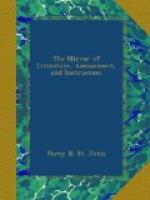Old Dr. Farmer, the head of Emanuel College, Cambridge, Prebendary of Canterbury, and afterwards of St. Paul’s, or Westminster, used to frequent a club in London, to which I belonged. He was at first reserved and silent: but his forte was humour and drollery. At Cambridge he neglected forms and ceremonies in his college too much: and was in all his glory when in dishabille in his study, with his cat by his side, and his Shakspeare tracts about him. He found no literature at Canterbury, and was disgusted with his brother members of the cathedral: quaint Dean Horne, and chattering romancing Dr. Berkeley, and his rhodomontading wife, were not suited to him, and as little her son Monke Berkeley, of whom she gave such an absurd and mendacious memoir, and who had none of his celebrated grandfather Bishop Berkeley’s genius. Farmer had some cleverness, but no leading talent. He collected an immense quantity of rare and forgotten old English books—especially poetry and the drama—at a trifling price. Todd, the learned editor of Milton, Spencer, &c., was then a member of that cathedral; but as his literary superiority was not pleasant to those above him in that establishment, he was got rid of by promotion, elsewhere, out of their patronage. He wrote the lives of the Deans of that Church, which does not rise to more than local interest. It is a dull book.
It has been my fate to be Acquainted with Irish Secretaries. I saw much of little Charles Abbot—afterwards Speaker—and at last Lord Colchester. He was a pompous dwarf; yet of an analytical head. Nothing could be more amusing than to see him strut up the House of Commons to take the chair; nor was the amusement less to listen to him, when he delivered his edicts, or the thanks of the House from the chair. His sonorous voice issuing from a diminutive person, and the epigrammatic points of empty sentences, formed with great artifice, were in very bad taste—though much admired by a House which consisted of so few men of a classical education. His rise was extraordinary, because his talents little exceeded mediocrity. But he was a courtier, and an intriguant. He was the son of a schoolmaster at Colchester.
Swift, though of English extraction, was born in Ireland. From some memoranda of my grandfather’s, I learn, that he did not speak of his residence with Sir William Temple at Moore Park, in Surrey, without spleen. He seemed to retain a sort of unwilling awe of Sir William; but not to have loved him. Sir William was a ceremonious courtier: Swift’s early habits were somewhat rude and slovenly. Swift had genius, as Gulliver’s travels prove; but there is no genius in his poetry. He was both proud and vain. His ancestor was the rector of a small living in Kent; his father an attorney. When I was quartered at Canterbury, I saw the monument for one of his ancestors, preserved out of the old church at St. Andrew’s and replaced in the new one. The arms sculptured on it are totally different from what Swift erroneously supposes the family to have borne: this ancestor was minister of that parish—not a prebendary, as Swift represents. Miss Vanhomrigg was cousin of my grandfather, who considered that Swift had used her very cruelly.




